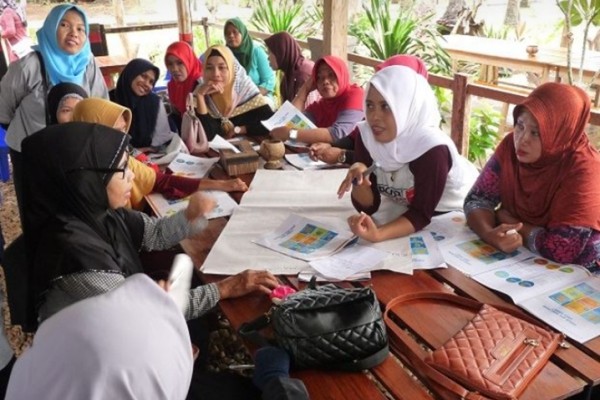
Women from Parak village, Selayar, Indonesia, brainstorm in a breakout group at the Waste2Enterprise workshop (Photo: M. Paterson).
New trial inspires women to create value from plastic waste
September 19 2018
Researchers from the CCRES behaviour change and business development teams have delivered a new intervention designed to inspire coastal communities to create value from plastic waste.
Using the behaviour change tool My Future My Oceans, and a business development workshop, Waste2Enterprise (W2E), researchers trialled the program at Selayar, Indonesia, during July.
Both My Future, My Oceans and Waste2Enterprise have been used at Selayar but never together.
Previously, My Future, My Oceans has been used to improve waste management in Bontolebang village, Selayar. In this trial, shifts in human psychology and behaviour were sustained four months after it was delivered.
Since January the business team has been using Waste2Enterprise to spread the word among coastal communities about how to use business solutions and community-based management to address the critical issue of ocean plastics. Ocean plastics can have significant impacts on coastal and marine ecosystems, as well as human health.
For the joint My Future, My Oceans/Waste2Enterprise activity, 96 women from two villages – Parak (intervention) and Padang (control) – were recruited for a four-day program that included facilitator training and participant workshops. Eleven psychometric indicators for women in both villages were measured before and after the trial.
“We found similar, consistent findings to our previous trials. Women felt empowered, and we witnessed demonstrable changes in behaviour. Integrating our behaviour change work with Waste2Enterprise provides these communities with a viable means to turn their behaviour into an alternative revenue stream,” said research leader Erik Simmons, The University of Queensland (UQ).
The Parak group posted higher post-trial scores for attitude and perceptions, including perceived plastic collection, problem solving skills and perceived responsibility for the environment. The results validate the use of My Future, My Oceans at a second village in Indonesia.
The core psychological competencies and behaviours targeted were plastic collection; problem solving skills; goal setting; checking whether the fish that participants consume are caught safely or by destructive methods; perceived responsibility for the state of the environment; satisfaction with life; attitudes to health; and perceived impact of actions on the environment.
As part of two days of My Future, My Oceans community workshops in their village, each of the 48 Parak women presented one bag of plastic and participated in goal setting, problem solving and positive thinking exercises, run by local CCRES facilitators Isma Andi, Andi Eti, Ghyta Lestary and Sunarty.
The My Future, My Oceans process comprises training of facilitators to deliver workshops, running of workshops to empower villagers, and the evaluation of outcomes. The process is supported by practitioner materials, including a project coordinator guidebook, facilitator handbook and participant workbook.
The last day of the trial was the Waste2Enterprise workshop. It included information and awareness sessions plus group activities and testimonials. The program was led by Dr Anna Phelan from UQ and Pak Firman Tri Ajie from the Indonesian Institute of Sciences (LIPI).
The aim of the workshop was to inform participants about the global challenge of ocean plastic and to empower them towards community-led waste management using specific examples and simple strategies. Participants were encouraged to develop their own business ideas for reducing, converting and collecting plastic waste to support sustainable livelihoods.
A workbook which included a template for an adaptable community-scale waste management plan was shared with participants to help them think about how they can manage plastic collection, conversion and mitigation.
The women’s ideas included reducing the use of single-use plastics through reusable baskets and containers, expanding the existing garbage bank and establishing a recycling facility, looking at more innovative ways at being a ‘successful collector’, and exploring potential markets for handicrafts made from plastics
“It was clear that many of the Parak women care deeply about their community and were very interested to explore enterprise-based solutions for addressing plastic waste management,” said Anna.



